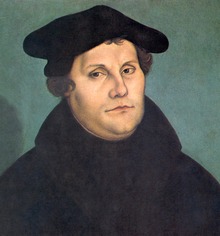
Martin Luther was not only a religious revolutionary, but also an anti-establishment, anti-materialist. In article 32 from his 95 Theses he plainly sets forth the idea that those who seek for and offer indulgences will be damned. This is much more of a serious accusation than simply pointing out that the Catholic church has erred in a small way. Furthermore, his argument goes into the idea that an individual's worth is not based on their wealth, nor should any part of their morality be tied to temporal possessions. This idea of worth outside of wealth is an important one to humanity as a whole and is still pertinent today.
This sort of anti-materialism pervades in humanists today, but not within some popular institutions. There are other methods with which we "damn" those who do not have wealth, such as access to knowledge and or education. Martin Luther questioning the Catholic Church paved the way for questioning other religious institutions, but also paved the way, at least in part through article 32, for questioning society's hyper focus on money and using it to buy some version of salvation. This idea also allows room for great individuals to come out of low stations and reinforces some of the main ideas of humanism as a whole. Great scholars and politicians do not have to come from a place of great wealth in the same way that great Christians do not have to achieve salvation by pecuniary means. Martin Luther's theses were of such great impact that they still echo into the culture, politics, and religion of today.
Sources:
Elmer, Peter, et al. The Renaissance in Europe: an Anthology. Yale Univ. Press, 2000.
Image from https://en.wikipedia.org/wiki/Martin_Luther (Public Domain)

It is important to note that Martin Luther's interest in changing some of the practices within the Catholic church did not come out of any disdain he had for the church overall. His intentions were pure, and as you said, he was looking out for the underdog. He certainly paved the way for those of lesser social status to contribute great ideas and inventions to the following centuries.
ReplyDeleteIn reading Martin Luther's "Explanations of the 95 Theses", the thing that caught my attention most was his focus on the inappropriateness of the justification of indulgences that were sin. As I thought more about justification of indulgences, I realized that I often become defensive when I am "called out" for my own indulgences that I should leave behind. The truth is, the guilty take the truth to be difficult. In the response from the Catholic Church to Martin Luther's 95 Theses, I believe that power was in their minds, not the correctness of doctrine.
ReplyDelete